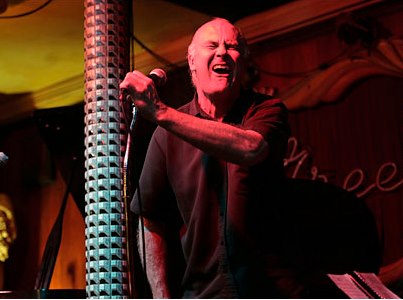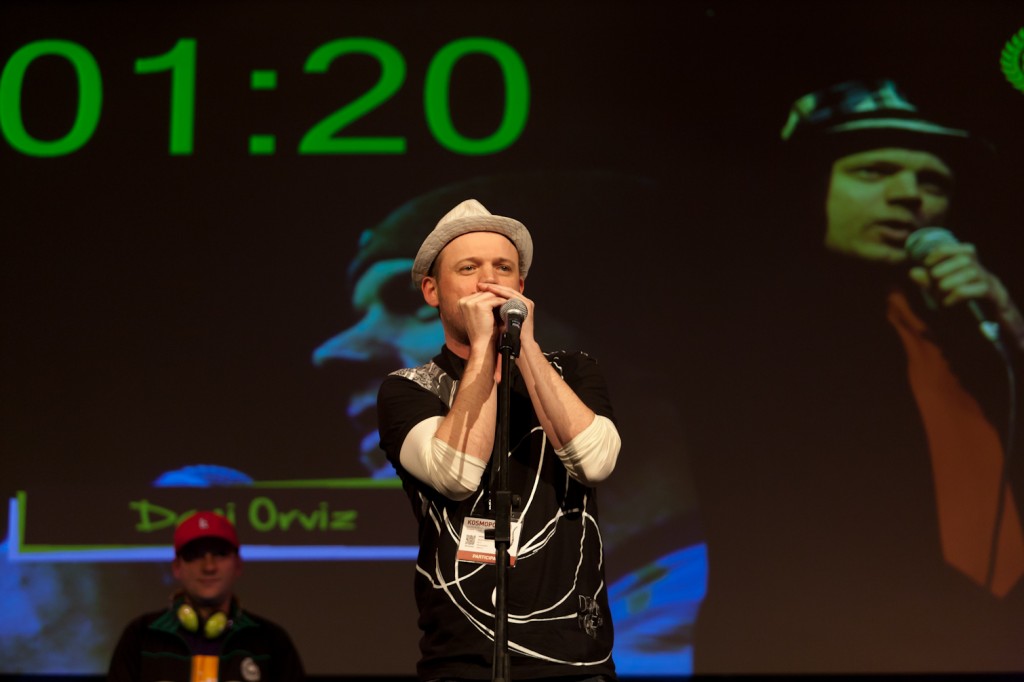 Born in Chicago in 1949, Marc Kelly Smith has received the nickname «Slam Papi». The Poetry Slam founder started the movement in 1986 in his home town, and since then its growth worldwide has been unstoppable.
Born in Chicago in 1949, Marc Kelly Smith has received the nickname «Slam Papi». The Poetry Slam founder started the movement in 1986 in his home town, and since then its growth worldwide has been unstoppable.
This Saturday, 18 May, Marc Kelly Smith will be in Barcelona joining the Poetry Slam Barcelona at the CCCB.
Ismael Guzmán has interviewed him.
Q: What does Poetry Slam mean to you?
MS: There are at least three definitions of Poetry Slam. The first is the remarriage of the art of performing with the art of writing poetry. The second is a highly entertaining interactive performance poetry event. And the third is an audience-judged performance poetry competition. What slam means to me, personally, is community, the large family of like minded people across the world participating and dedicating themselves to the slam movement.
Q: What were your feelings when you started forming this? Did you realize it could become what it is today?
MS: From very early on I knew that performance was the answer to attracting larger audiences for poetry. Almost all the principles that guide slam were by intention: The poet’s job is to communicate effectively and serve his/her audience. The audience is the arbitrator of what’s good and bad, not some single editor of an institution. Slams are open to all forms of poetry, all themes, and to people from all walks of life. I was very certain that it would catch fire and spread across the United States. I never imagined that it would become a worldwide phenomenon.
Q: In your opinion, what does Poetry Slam provide to literature?
MS: If literature is going to be read or recited aloud on stage in front of a public audience it should be done so with as much craft, passion, and art as is experienced in any of the performing arts. Performance poets (slammers) should strive to be on an equal level with the best actors, singers, dancers, etc. of our time. When they do so, they bring literature alive to audiences, stirring them in the same way that great plays and musical concerts do.
Q: Many poets refuse to be judged with a score. What would you say to them?
MS: Poets (all artists) are constantly being judged by friends, readers, editors, publishers, producers, etc. Slam competitions are lively ways of focusing an audience’s attention on the stage. The competition is a theatrical device designed to create drama and suspense. Every time a performer takes the stage he or she is being judged, whether they’re being scored or not.
Q: If I’m a slammer who has just set out, what could Marc Smith teach me?
MS: In my introductory workshop I give the poet/performers a vocabulary for examining and developing the fundamental elements of performance: volume, tempo, articulation, persona, mood, voice, gestures, eye contact, etc. Our bodies, voices, and minds are our instruments. We need to learn how to use them and play them well. The workshop also guides poet/performers away from any stage fright they might be suffering from.
Q: If I’ve been a slammer for years, what could Marc Smith teach me?
MS: The best of the professional performing artists I know never stop seeking out new techniques and tricks of the performance trade. For the journeymen slammers I will offer what I know and what they need from my 30 years as a stage performer.
Q: We define Poetry Slam as 50% performance and 50% poetry. Is that correct? Or do you think one or the other is more important?
MS: That’s what we set up at the beginning, decades ago, and I think that it should still be the guide. Slammers should strive for the best possible text presented in the best possible performance. Of course, the ideal is rarely achieved: sometimes the text outweighs the performance, or the performance is slicker than the words, but the goal is both page and stage being the best possible.
Q: Your phrase “Slam is community” is famous in the Slam world. How can this be when poets are often individualistic and often egoistical?
MS: In my opinion the human experience is a constant struggle between those who find purpose in serving their communities and those who are out for themselves. Greed versus giving. Arrogance versus humility. The poetry slam community is an arena where people can either evolve into service-minded individuals or keep chasing their ego-minded desires like an ever-thirsty ghost.
Q: Why do you think this movement has had so much success?
MS: Because of the dedicated, selfless organizers (hundreds – maybe in the thousands now – who are never in the spotlight) who set the stages and draw the audiences together; and, of course, the art of performing poetry which brings the words alive and makes them matter more than they would if there were only on the page.
For more information, visit: www.poetryslambcn.com, Facebook, Twitter and YouTube.
Poetry Slam Barcelona is organised and produced by Hipnotik Faktory and Red927, and it has the support of the CCCB and ICUB – Barcelona City Council.








